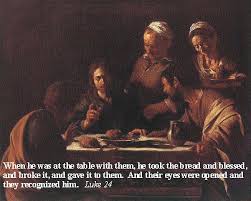
“Then Jesus said to them, “Very truly, I tell you, it was not Moses who gave you the bread from heaven, but it is my Father who gives you the true bread from heaven. For the bread of God is that which comes down from heaven and gives life to the world.” (John 6:24-35, NRSV).
Bread is fundamental to our lives. Bread contains the sustenance and substance to nurture our body.
Bread is a perfect beginning point for Contemplative prayer. All of the elements of creation are present in the making of bread. The sun, soil, rain, seed, flour, sugar, salt, and eggs. The farmer who plants the seeds to grow the wheat, and harvest it. The merchant. The baker. Heat for baking. All of these have their origin in God’s goodness. Those who do the work are co-creators with God.
In The Rule of St. Benedict, Chapter 39 The Proper Amount of Food; he instructs the Community to have “a generous pound of bread” to be prepared for the meals of the day. The Desert Mothers and Fathers prepared a single loaf of bread to be used for the day.
God brings together everything that is good to give us life. Jesus, the Bread of Life, is the life of God in our common humanity who feeds us with the fullness of God. God knows all that is good and holy within us. God knows that we need help to draw closer to the Holy One through what is tangible. God gives us what we need to nourish and sustain our faith and life. God wants us to search for union with God with what is right in front of us in the here and now. We may not see God with our physical eyes or human logic. It is only by faith that we can reach out to grasp with the whole of ourselves, the God-Life that will transform us by that “amazing grace” to live into our true selves in Christ.
How is God the Bread of Heaven nourishing your life?
Amen.
Peace be with all who enter here.
Brother Anselm Philip King-Lowe, OSB
If you feel led to buy me some coffee, please scroll down to the bottom of the right sidebar and click on the Benedictine Coffee Mug. Thank you so very much.

